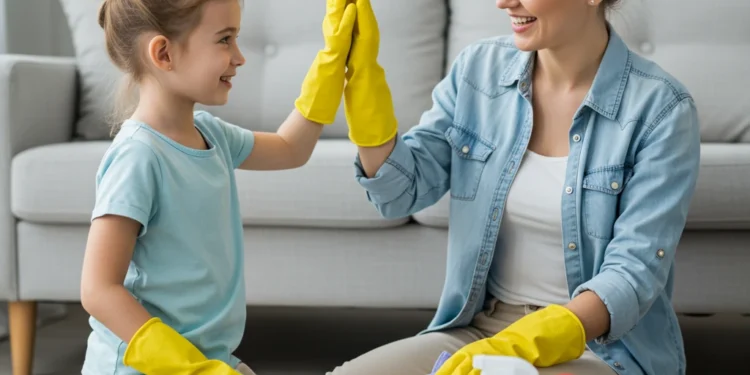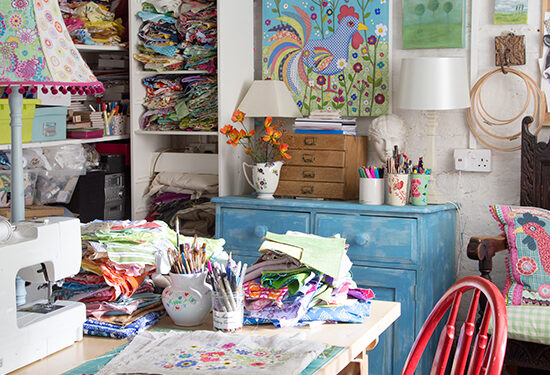Keeping your home tidy with kids around can sometimes feel like an uphill battle. Toys magically multiply overnight, spilled snacks appear in the oddest places, and the youngest Picasso prefers displaying art on furniture and walls rather than canvas.
Keeping your house clean and organized doesn’t have to be a Herculean task. All you need are consistent routines, a few smart storage solutions and kid-friendly strategies. You can keep messes under control and reclaim your home while teaching your children valuable life skills.
1. Establish a Daily 10-Minute Tidy-Up Ritual
Spending a few minutes toward the end of each day on a family-wide cleaning blitz can make a big difference since messes grow harder to tackle when they sit for days.
Set a timer on your phone and turn on some upbeat music. Challenge everyone to pick up their toys, stash books back on shelves and fold blankets. Perhaps the kids race each other to finish first, turning the tidy‑up into a fun habit.
Consider making it part of your family’s nightly wind‑down routine. A little effort every day keeps clutter from piling up. Over time, these small efforts add up, leaving you with a consistently tidier space that’s easier to maintain. Most importantly, the little ones learn that housekeeping is an ongoing responsibility, not a punishment.
2. Create Clearly Labeled Storage Zones
Strategically place bins, baskets and cubbies around the house and tell everyone where each type of item belongs. To help early readers, label bins with both words and pictures. Laminate a photo of the bin’s contents and tape it to the front, so they know exactly where things go.
When it’s time to tidy up, you can say, “Let’s put all the toys away first, then pick up the books and clothes.” This approach is fast and visual, and even preschoolers can follow along.
3. Designate Dedicated Activity Zones
Rather than letting kids spread art supplies or toys everywhere, point out specific areas and rooms in the house for play and projects. These clear boundaries help contain messes, protect your floors and furniture, and make cleaning easy.
In these spaces, line a low shelf with a shallow bin to catch LEGO pieces. Clear plastic drawer units can help contain markers, crayons, glitter and other art supplies. You can roll out a washable mat under the craft table, set up a cozy reading or creativity nook with floor cushions, and lay a rug in the block‑building zone to shield their knees.
4. Implement a “One In, One Out” Rule
To teach your kids generosity — and keep clutter at bay — encourage them to choose one old toy to donate for every new one they receive. The best time to do this is before birthdays and holidays. Framing donation as an act of kindness makes it more meaningful.
5. Invest in Kid-Friendly Materials
Mistakes happen, and you should get used to them. Sticky fingers, accidental spills, muddy footprints and temporary “amnesia” are part of life with kids. Opt for paint finishes labelled “scrubbable” or “washable” to protect surfaces and walls. Slipcovers on sofas, machine‑washable rugs and even removable cushion covers on dining chairs can make cleaning easy. Kid-proof materials let you bounce back from messes quickly with minimal scrubbing.
6. Schedule a Weekly Deep-Clean Power Hour
Between your nightly tidies and daily chores, carve out one longer session each week for deeper cleaning. Use this time to do tasks you don’t do daily, like vacuuming upholstery, wiping down baseboards and light switches, and sanitizing the bathroom. Enlist older kids for tasks like dusting picture frames or sorting pantry shelves. Once the job’s done, reward everyone with a family treat — homemade cookies, movie night or a sticker on the chore chart — to keep motivation high.
7. Assign Simple, Age-Appropriate Chores
While it might be quicker for parents to complete tasks themselves, involving children in household duties benefits their development. These tasks help them develop essential life skills — responsibility, accountability, problem-solving and independence — that they’ll carry into adulthood. Starting at ages 1 to 3, children develop cognitive skills like understanding commands, so giving them chores can help them practice these skills.
Giving your kids specific duties lightens your load, too. For toddlers, asking them to put stuffed animals in a basket or set the table is manageable at that age. Elementary‑aged kids can sort socks when you do laundry or wipe dust from low shelves. As they get older, involve them in loading the dishwasher, sweeping floors, making their beds and helping out in the kitchen.
Keep things fresh by rotating chores weekly or monthly. This way, no one feels stuck with the same task, and everyone learns every routine. Also, consider designing a chore chart together and using it with stickers or magnets to visually track progress.
8. Make It Fun
Kids love to have fun, and anything that presents as such is often acceptable. To achieve this, begin with less structured games like setting a song as a timer and seeing who can tidy up before the song ends. Or introduce a friendly “room race” and come up with a reward system, like choosing the next family game, to keep spirits high.
9. Keep a Portable Cleaning Caddy Handy
When spills happen, speed is key. Keeping a small caddy stocked with microfiber cloths, gentle all‑purpose cleaner and sanitizing wipes can come in handy in the least expected moments. Store it on a low shelf so you or an older child can grab it quickly when a juice box tips over or a craft project flops. Mess never stands a chance.
10. Use the Right Tools for Efficiency
Strategic cleaning equipment makes jobs easier:
- Keep microfiber cloths in every room for quick wipe-downs.
- Invest in a quality vacuum that can handle kid messes.
- Use washable mop pads rather than disposables for better cleaning.
- Consider steam cleaners for sanitizing without chemicals.
11. Establish Meal and Snack Zones
Let everyone know that the kitchen and dining area are the designated snack zones. Use a placemat or a small portable tray to catch crumbs, and teach kids to clear their own dishes afterward. Having meals in one spot saves you countless sweeps and vacuum runs.
12. Model Clean-As-You-Go Habits
Whether you’re cooking, crafting or playing a board game, show your kids how to tidy up along the way. They’ll follow suit when you practice what you preach — learning that small, consistent efforts prevent big messes and clutter.
13. Set up a Donation Station
Dedicate a box or bin in a hallway or closet for items to donate. Have all house members find outgrown clothes or used toys, and drop them in the donation station. Once it’s full, schedule a trip to a local charity together. Keeping a visible bin reminds everyone to let go of things they no longer need.
14. Set Your Standards to Parent-Level
Instead of aiming for magazine-worthy spaces:
- Redefine your mindset. In a house with kids, “clean” is “functional and reasonably tidy.”
- Prioritize health and safety over spick-and-span. A few toys on the floor don’t mean your home is dirty.
- Celebrate small victories, like keeping the kitchen sink empty overnight.
A home with children is a lived-in home, and that’s exactly how it should be.
15. Be Kind to Yourself
Remember that a messy home means children play, create and live fully. Your children will remember the fun you had together, not whether every surface was spotless. Your housekeeping standards don’t measure your worth. “Clean enough” is perfect.
Ready to Tackle the Mess?
Maintaining a clean, harmonious home with kids requires you to be patient and proactive with a healthy dose of playfulness. Pick one tip today — set up that donation box or label those bins. Whatever your choice, give yourself a pat on the back as the small things lead to big changes. Happy cleaning!












